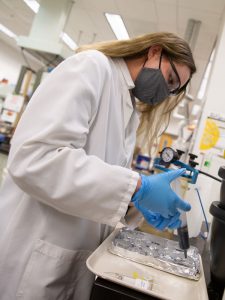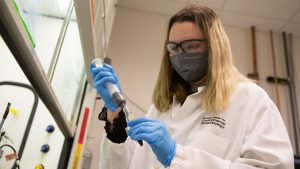Smith Wingfield Pittman
Environmental engineering
Hometown: Tallahassee, Florida, United States
Graduation date: Spring 2022
GCSP research stipend | Spring 2021
Use of Rabbit Fecal Matter for Lignin Degradation in Wastewater Treatment Systems
This research investigates a method of biologically pretreating lignin using bacteria obtained from rabbit fecal samples, as rabbit diets consist largely of lignocellulose. Under anaerobic conditions, these microbes are expected to consume yard trimming such as grass and bushes with a high amount of lignin, producing volatile fatty acids (VFAs) and methane. VFAs are useful as commodity chemicals, while methane can be an energy or heat source. This research demonstrates that biologically pretreated lignocellulose samples produce more VFAs and methane than what would be produced in a typical anaerobic digester.
Mentor: Bruce Rittmann
Featured project | Spring 2021
Smith Pittman is an environmental engineering junior in the Grand Challenges Scholars Program. For the research or talent competency of the GCSP, she conducted research with Regents Professor Bruce Rittmann and Assistant Research Scientist Michelle Young to study whether cellulose predigested by microbes can recover valuable products from anaerobic digesters at wastewater facilities.
What made you want to get involved in the Grand Challenges Scholars Program?
I wanted to get involved with GCSP because as an engineer it is really important to understand the social impacts of the work you do.
Why did you choose the project you’re presenting at the FURI Symposium?
This is a relatively novel research topic, and so I think there will be potential for continued research after this project.
How will your engineering research project impact the world?
Lignocellulose is an abundant untapped resource, as it is mainly considered waste biomass from industrial processes. Finding ways to degrade it, and thereby produce valuable products, will create more sustainable processes.
In general, my mentor and I have been pleasantly surprised with the results we are getting from the experiment.
What has been your most memorable experience as a student researcher?
This is a little gross, but sometimes when feeding the reactors (which take waste materials and turn them into valuable byproducts), they will spit sludge back up. The first time this happened I was not prepared and it got everywhere. I was later able to figure out that it was due to gas buildup, and I could prevent this from happening by keeping the gas bags attached.
How do you see this experience helping with your career or advanced degree goals?
I would like to continue researching, so I am looking at graduate schools. This experience has been incredibly helpful for me because it has helped me find something that I enjoy.
What is the best advice you’ve gotten from your faculty mentor?
My mentor has really encouraged me to pursue my interests, which has helped me inside and outside the research lab.
I am very grateful for the support I receive from Dr. Rittmann, Dr. Michelle Young and GCSP.
Why should other students get involved in GCSP?
GCSP is a wonderful program for students who want to have a positive impact on the world around them, and want to know about the future of engineering. I think students should also get involved in undergraduate research because it helps you to understand the application of what you are learning in your classes.


